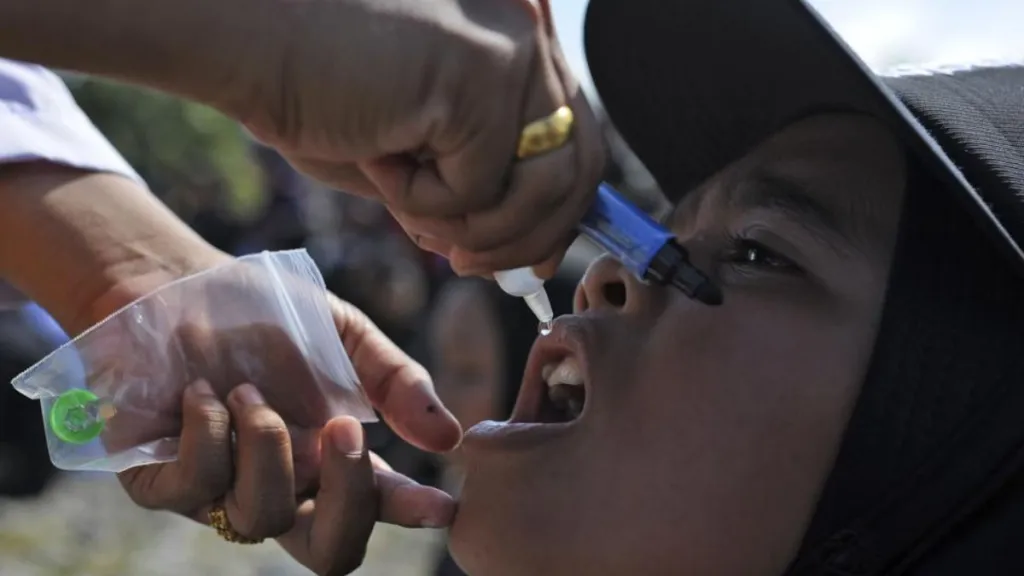Introduction

Polio, also known as poliomyelitis, is a highly infectious disease that can cause paralysis, deformity, and even death. The disease is caused by the poliovirus, which is spread through contaminated food and water, as well as through person-to-person contact. Indonesia, a country with a population of over 273 million people, has been working tirelessly to eradicate polio since the launch of its national immunization program in the 1970s. In 2025, the Indonesian government, in collaboration with international partners, is intensifying its efforts to eliminate polio through a comprehensive vaccination campaign. This article will explore the current state of polio vaccination campaigns in Indonesia, the strategies employed, and the challenges faced in achieving the goal of polio eradication.
Background
Indonesia was declared polio-free by the World Health Organization (WHO) in 2014, after no cases of wild poliovirus were reported for over two years. However, in 2020, several cases of vaccine-derived poliovirus (cVDPV) were reported, highlighting the need for continued vigilance and immunization efforts. The Indonesian government, with the support of international partners such as the WHO, UNICEF, and the Bill and Melinda Gates Foundation, has since stepped up its efforts to strengthen its immunization program and eradicate polio once and for all.
2025 Vaccination Campaigns
The 2025 polio vaccination campaign in Indonesia is a nationwide effort aimed at immunizing all children under the age of five against polio. The campaign is being implemented in two phases: the first phase targets all provinces, while the second phase will focus on high-risk areas. The vaccination campaign is using the oral poliovirus vaccine (OPV), which is a safe and effective vaccine that has been widely used in many countries.
The vaccination campaign is being implemented through a variety of channels, including:
- Fixed vaccination posts: These are designated vaccination centers where parents can bring their children to receive the vaccine.
- Mobile vaccination teams: These teams travel to remote areas to vaccinate children who may not have access to fixed vaccination posts.
- Community outreach: Health workers are going door-to-door to educate parents about the importance of vaccination and to administer the vaccine.
- School-based vaccination: Vaccination teams are also visiting schools to vaccinate children in a more efficient and effective manner.
Strategies Employed
To ensure the success of the vaccination campaign, the Indonesian government is employing several strategies, including:
- Social mobilization: The government is working with community leaders, religious leaders, and other influencers to raise awareness about the importance of vaccination and to encourage parents to vaccinate their children.
- Partnerships with civil society organizations: The government is partnering with non-governmental organizations (NGOs) and community-based organizations to support the vaccination campaign and provide additional resources and expertise.
- Use of technology: The government is using digital technologies, such as mobile phones and social media, to disseminate information about the vaccination campaign and to track progress.
- Monitoring and evaluation: The government is closely monitoring the vaccination campaign and evaluating its effectiveness to identify areas for improvement.
Challenges
Despite the progress made, there are still several challenges that need to be addressed in order to achieve the goal of polio eradication in Indonesia. Some of these challenges include:
- Geographical barriers: Indonesia is a vast and geographically diverse country, with many remote and hard-to-reach areas. Reaching these areas with vaccination teams can be a significant challenge.
- Vaccine hesitancy: Some parents may be hesitant to vaccinate their children due to misinformation or concerns about the safety of the vaccine.
- Limited resources: The vaccination campaign requires significant resources, including personnel, equipment, and funding.
- Conflict and security concerns: In some areas, conflict and security concerns may hinder the ability of vaccination teams to reach children in need of vaccination.
FAQs
Q: What is polio and how is it spread?
A: Polio, also known as poliomyelitis, is a highly infectious disease caused by the poliovirus. The disease is spread through contaminated food and water, as well as through person-to-person contact.
Q: What are the symptoms of polio?
A: The symptoms of polio can range from mild to severe and may include fever, headache, stiffness, and paralysis.
Q: Is the polio vaccine safe?
A: Yes, the oral poliovirus vaccine (OPV) used in Indonesia is safe and effective in preventing polio.
Q: How can I get my child vaccinated?
A: You can take your child to a fixed vaccination post, or wait for a mobile vaccination team to visit your area. You can also contact your local health authority for more information.
Q: What are the goals of the 2025 vaccination campaign?
A: The goals of the campaign are to immunize all children under the age of five against polio and to achieve polio eradication in Indonesia.
Conclusion
The 2025 polio vaccination campaign in Indonesia is a critical effort to eradicate polio and protect the health and well-being of Indonesian children. Through a comprehensive approach that includes social mobilization, partnerships with civil society organizations, use of technology, and monitoring and evaluation, the government is working to overcome the challenges that have hindered previous efforts. While there are still significant challenges to be addressed, the progress made so far is a testament to the dedication and commitment of the Indonesian government and its partners to achieving a polio-free future. With the support of the international community and the continued efforts of health workers, community leaders, and parents, Indonesia can ensure that its children are protected against this devastating disease and that polio is finally eradicated.
Closure
Thus, we hope this article has provided valuable insights into Polio Vaccination Campaigns in Indonesia 2025: A Comprehensive Approach to Eradication. We hope you find this article informative and beneficial. See you in our next article!